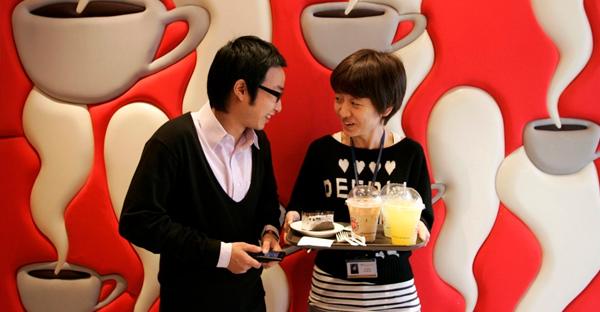[ad_1]

A couple talks at a coffee shop in central Seoul. (Han Jae-Ho / Reuters)
How corruption scandals are driving young Christians away from megachurches—and conservative politics
The electronic keyboard and acoustic guitar kicked in as the junior minister opened this past Sunday’s service with a public prayer. He spoke in a rapid-fire cadence as the 20 members of the evangelical church tried to keep pace, before rising to recite the Apostle’s Creed, a proclamation of their faith.
This house of worship in central Seoul is one of the tens of thousands of small Protestant chapels across the country that are trying to lure believers away from South Korea’s megachurches. Some, like this one, are doing so by satisfying the longing for a close-knit religious community as well as the craving for a cappuccino.
The church’s name is Jesus Coffee.
“Churches and cafés have the hardest time surviving in Korea,” said Ahn Min-ho, a 42-year-old ordained minister and certified barista. “Combining the two is mutually beneficial.”
South Korea is divided between Buddhists (15.5 percent), Protestants (19.7 percent), Catholics (7.9 percent), and non-believers. Among the large population of Christians, the model of the combined “café church” has taken off in recent years. These grassroots affairs provide a counterpoint to the massive, hierarchical, institutionalized megachurches in a country where many are distrustful of major institutions, both religious and political. Megachurches have lately been implicated in high-profile corruption scandals; the founder of Seoul’s Yoido Full Gospel Church, which claims a congregation of nearly 800,000 people and is the largest megachurch in the world, was convicted of embezzling $12 million in church money in 2014. In the political realm, former conservative president Park Geun-hye—whose father once served as president as well—was impeached in March for her alleged masterminding of a vast bribery scandal that has landed her in prison.
Customers at Ahn’s café church can peruse a selection of Christian literature while nursing their lattes, which are about a dollar cheaper than at some of the neighborhood’s big-name franchises. A cross-adorned wooden shed in the corner, marked “Prayer Room,” contains a desk with a Bible on top. The sanctuary is located in a windowless room in the back, behind the espresso machine and industrial-strength coffee grinder.
Ahn told me he welcomes newcomers who, like him, feel Christianity in South Korea has become “too institutionalized.” That seems to be a sentiment shared by many worshipers in their 20s and 30s, who are, according to reports, increasingly leaving their churches amid feelings of disillusionment with organized religion.
And many don’t hold the same political views as older generations.
“Christians over the age of 50 are more likely to vote for the conservatives,” said Ms. Lee, a 40-year-old mother of three who was slowly finishing an iced vanilla latte at Jesus Coffee after the service. “We think differently from them.”
This generational divide mirrors a rift among the general population: According to a recent Gallup poll, ahead of Tuesday’s election most South Koreans aged 60 or older preferred the conservative or centrist politicians who take a hardline policy on North Korea, while voters in their 30s overwhelmingly favored the progressive candidate and care more about clamping down on corruption. Indeed, in a survey conducted by local pollster RealMeter, 27.5 percent of respondents said that a candidate’s “intention to resolve deeply-rooted corruption” was the most crucial quality; by contrast, only 18.5 percent said “protection of national security and liberal democracy” was most important.
Click here to read more.
SOURCE: The Atlantic
Jason Strother
Related
[ad_2]
Source link
